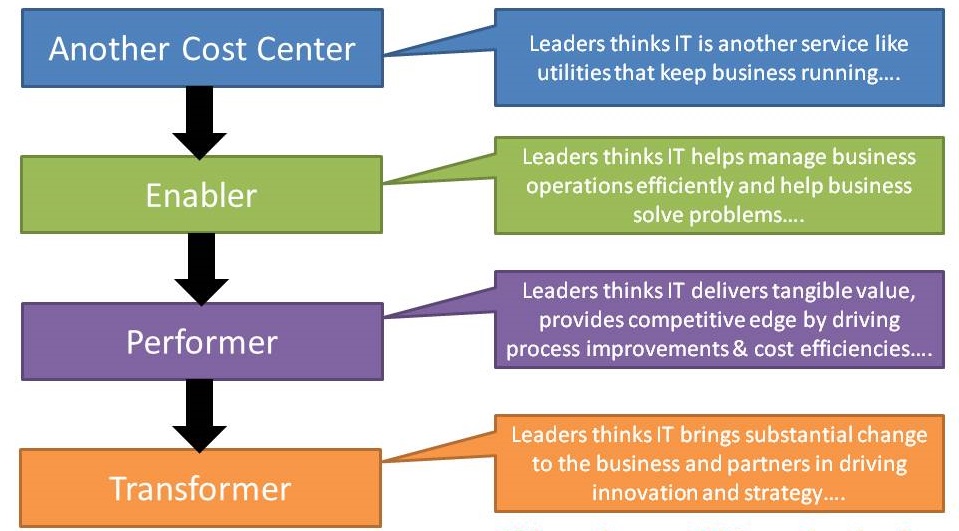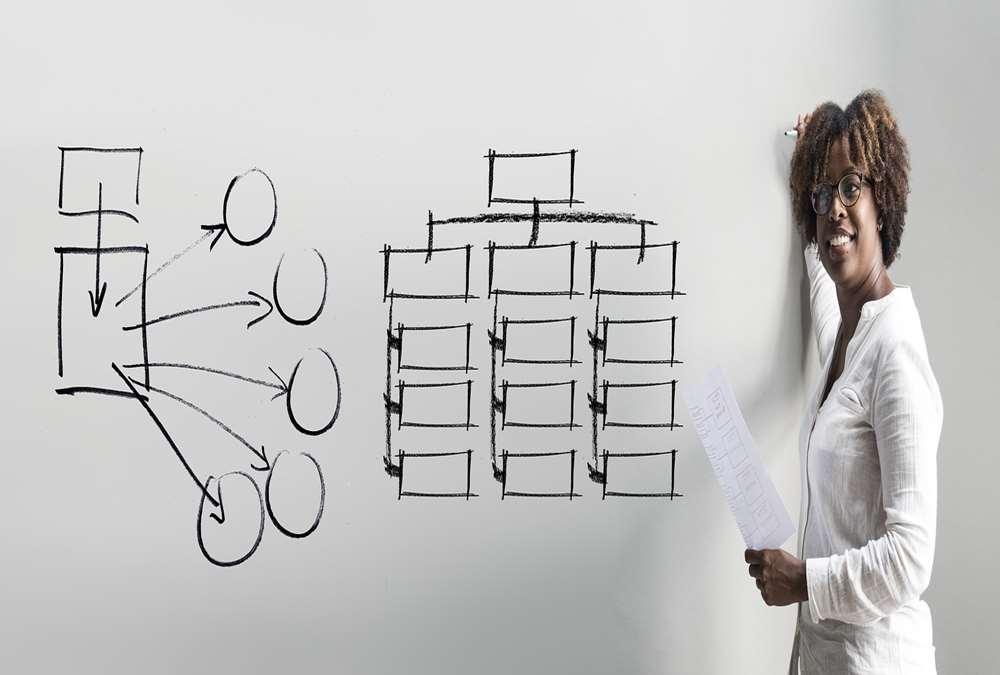- Home
- Business Processes
- Industry Knowledge
- Aerospace Industry
- Automotive Industry
- Banking Domain
- BFSI Industry
- Consumer/ FMCG Industry
- Chemicals Industry
- Engineering & Construction
- Energy Industry
- Education Domain
- Finance Domain
- Hospitality Domain
- Healthcare Industry
- Insurance Domain
- Retail Industry
- Travel and Tourism Domain
- Telecom Industry
- Leadership Skills
- eLearning
- Home
- Leadership
- Leadership Theories
- Transform IT Role
Transform IT Role
Technology represents tremendous value if you view it from the proper perspective. IT empowerment also has its various levels in any organization. As a CIO or IT Senior Leader, you should try to move the technology function up the value chain. Learn how to transform your service delivery organization being looked upon as another cost center to a business partner that provides valuable services and brings competitive advantage for the business.
IT is another Cost Center
IT is Enabler
IT is a Performer
IT as a Transformer

Related Links
You May Also Like
-
Team Development by Building Trust
As your team begins to work together, you need to establish a way each team member can exchange ideas and build mutual trust. Successful groups are built on trust and collaboration. A free exchange of ideas, in an open environment, will allow your team to get to know each other and enable you to check on how they work together. Learn some tips to help build team trust and establish personal bonds.
-
Evaluating Your Career Interests
Want to find out what you are best at when it comes to proactively building your career? What are your real interests? The first step in career planning is reflecting. Reflecting upon your own self, to be more self-aware, and then following your dreams with both your heart and mind. Here is an opportunity to begin exploring yourself. At the end of the process, you will have a far better understanding of your desires than you have currently.
-
Improving Skills & Competencies
Whenever you are looking for a job or having your yearend discussion with your manager, two terms generally referred to be “Skills” and “competencies”. Today success in a career is an outcome of having essential competencies and building required skills. Skills could be a major distinguishing factor for you to move up on the career ladder and jump from one role to another. Leadership skills when combined with relevant domain and functional expertise can transform your entire career growth and help you have a fulfilling career.
-
How often do you have a plan for how you are going to spend your day but you aren't able to complete the tasks on your plan because of unimportant tasks, interruptions, or your own procrastination? Wouldn't it be great to be able to manage your schedule and your time while avoiding, or at least controlling, these time stealers? Learn the strategies to manage your schedule while still handling interruptions and demands on your time.
-
Emergent leadership occurs when a group member is not appointed or elected as leader, but rather that person steps up as the leader over time within-group interactions. Have you ever faced challenges in getting accepted into your new role of position as a leader? Groups don't automatically accept a new "boss" as a leader. Emergent leadership is what you must do when taking over a new group. Learn more about emergent leadership.
-
At different points in your professional career, it is helpful to identify your core values. Values are the qualities considered to be the most important guiding principles that determine the priorities in your life and greatly influence your career choices. Your career brings happiness when it is in agreement with the beliefs you have about what is important and meaningful to you. Awareness of your values will help you develop a clearer sense of what's most important to you in life.
-
A manager or an employee in an organization who is experiencing a high level of stress may develop high blood pressure, ulcers, irritability, difficulty in making routine decisions, loss of appetite, accident proneness, and the like. These can be subsumed under three general categories, physiological, psychological, and behavioral symptoms. Stress can give rise to a number of changes.
-
What are some of the smartest things you can do in your early career that can help you become successful? The more you challenge yourself early on and gain a multitude of experiences and skills, the more successful you'll become down the road. In this article, we have compiled our best career advice including tips from career and recruitment experts. Here are some important tips to keep in mind as you plan your education and training, your career, and your life.
-
Narrative leadership is interpreted as the leader who aspires to construct leadership by telling stories. Leadership is a task of persuasion, of winning people’s minds and hearts. Storytelling is thus inherently suited for the task of leadership. Learn about the narrative leadership style and how to use this style to inspire and motivate followers or to manage change.
-
Develop your Leadership Skills
There are a number of broad skill areas that are particularly important for leaders. Today's demanding global business landscape is defined by relentless change and rising business complexity, bringing new challenges. Leadership skills provide career-enhancing resources and support you to be exceptionally successful in your career. Leaders need to provide direction to their teams and need to be able to make good and timely decisions to define and support strategic direction for the enterprise.
Explore Our Free Training Articles or
Sign Up to Start With Our eLearning Courses

About Us
Learning
© 2023 TechnoFunc, All Rights Reserved










